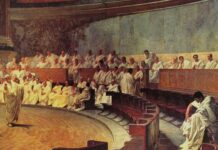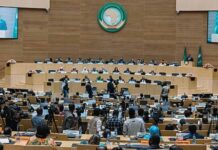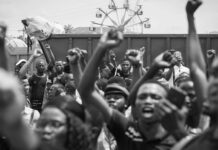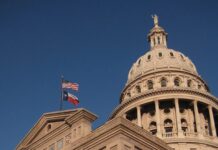
Over the last few weeks, on social media, there has been a growing chorus of right-wing influencers lamenting the persecution of Christians in Nigeria. The argument typically goes that while much of the world has been focused on the war in Gaza, there are thousands of Christians being killed in Nigeria. These, mostly right-wing influencers, use this issue to call out the supposed hypocrisy of human rights organisations and international bodies like the United Nations for the massive amounts of attention paid to Gaza compared to other conflicts around the world.
Christians are being massacred in Nigeria right now and the mainstream media is silent.
— PeterSweden (@PeterSweden7) September 28, 2025
Likewise, this calling out of attacks on Christians is also done as part of a more general anti-Islam message by these right-wing influencers to warn about the spread of Islam around the world and in the West, particularly. American comedian Bill Maher would even dedicate part of his programming on his late-night show, Real Time with Bill Maher, to shine light on the persecution of Christians in Nigeria. Various right-wing publications, like the Free Press, have also put out articles on this topic. People have even gone as far as to describe these attacks on Nigerian Christians as a genocide.
Bill Maher delivers a surprising moment on air as he calls out the slaughter of CHRISTIANS in Nigeria that the media refuses to cover.
— Vigilant Fox 🦊 (@VigilantFox) September 27, 2025
“If you don’t know what’s going on in Nigeria, your media sources SUCK,” Maher said.
“You are in a BUBBLE. I’m not a Christian, but they are… pic.twitter.com/XzDD3LYBPB
However, how much of this is based in reality and how much of it is just hyperbolic social media posts? Well, by all available evidence, it is clear that there is a Christian persecution problem in Nigeria. The number of Christians who have been killed this year alone is estimated to be around 7000 by human rights organisations. For decades, at this stage, Nigeria has effectively been the global epicentre of Christian persecution. Reports of attacks on churches, massacres of Christian communities, kidnapping of priests and church congregants have been commonplace for years.
This is, by its definition, Christian persecution because these people are killed for their faith. Rights groups have detailed the destruction of around 10,000 churches that have been destroyed in Nigeria since 2009. Likewise, since 2009, the human rights organisation Open Doors estimates that around 125,000 Christians have been killed and around 12 million Christians have been displaced within Nigeria. If such large numbers of Christians are killed for their faith by Islamist militants, there can be no other description of these actions other than persecution.
However, while it is certainly true that Christians have been and continue to be targeted for their faith by Islamist militants in Nigeria, the reality is that Nigeria in general has a major issue with militancy all across the country. Islamist militant groups have been responsible for the death and displacement of millions of Nigerians, Christians and Muslims alike. Earlier this year, Amnesty International came out with a report detailing the deaths of over 10,000 Nigerians in the first two years of President Tinubu’s tenure.

You would find that many Nigerians are aware of somebody who has had a relative or associate who has fallen victim to some form of violence at the hands of the militant groups that operate across the country. There are the Islamist terrorist organisations such as Boko Haram, Islamic State West Africa Province (ISWAP) and Fulani extremists. However, there are also violent separatist groups such as the Indigenous People of Biafra (IPOB), militant vigilante groups and gangs that run amok in many communities across Nigeria where there is little to no law enforcement presence.
So while it is true that the persecution of Christians is a major problem in Nigeria, it is part of a larger problem of militancy around the country. A major issue that the Nigerian government at the state and federal levels has failed to deal with. It is undoubtedly the case that the true death tolls that exist as a result of this violence is much higher than what even human rights organisations estimate. Unlike in other countries where such events are documented by the government, the Nigerian government has proven to be very unreliable in its record-keeping of such tragedies.
In reality, Nigerian politicians are far more likely to downplay or dismiss this reality. All you would have to do is look at the reaction by the Nigerian government to the reports of Christian persecution in our country. In a statement released by the information minister, Mohammed Idris, there was more time dedicated to hailing the supposed achievements of the government in combating terrorist organisations than to the dire security situation across the country. In addition to attempting to dismiss the idea entirely that there is any kind of Christian persecution.
— Mohammed Idris, FNIPR (@HMMohammedIdris) September 28, 2025
Rather than acknowledge the reality of the persecution of Christians, the information minister sought to portray Nigeria as a bastion of religious tolerance. Stating “Christianity is neither endangered nor marginalised in Nigeria,” which is an obviously false statement when looking at the large number of deaths of Christians and attacks on churches. Yes, insecurity indeed affects all parts of Nigerian society; however, when Christians and their places of worship are being attacked by terrorist groups for their faith, then that is a clear example of religious persecution.
There is no value to be gained in attempting to downplay or sugarcoat the situation that is playing out across Nigeria. Yes, there is a major problem of Christian persecution, evidenced by the large number of attacks on Christian communities. This is part of the broader insecurity crisis faced by Nigeria as a whole. What we need is a government that acknowledges the severity of this situation and tackles this crisis head-on, instead of downplaying it and boasting of its supposed accomplishments, as the house remains on fire.











